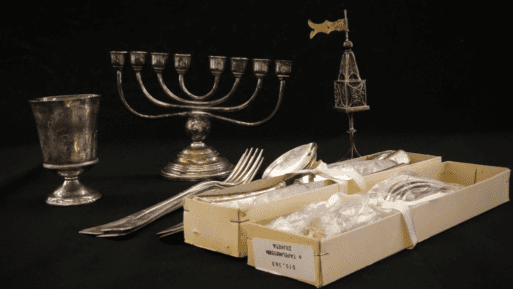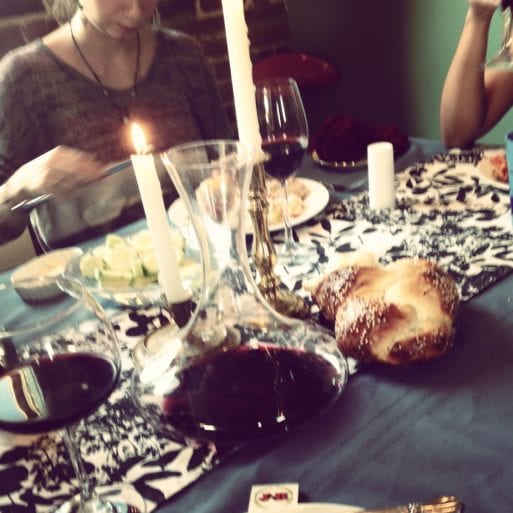This is Grace’s story as told to Jeanette Summers. Our “Opening Our Hearts” stories are based on people’s real-life experiences. By sharing these experiences publicly, we hope to help our readers feel less alone in their grief and, ultimately, to aid them in their healing process. In this story, Grace talks about her grief following her parents’ recent divorce, which was the death of her family as she knew it.

My parents met on a video dating site in the ’90s and, after an intense long-distance romance, married less than a year later.
I am mourning in the wake of my parents’ recent divorce. This is a fresh loss. My shock has, to a degree, anesthetized my pain, but I know that deep down, I am grieving. The pain often manifests as brain-scrambling anxiety. There are days when I can’t think straight — days when I can barely catch my breath.
My mother and father were married for two decades. They met in the ‘90s, before dating websites or apps existed, through video personals. The earliest phase of their relationship was long-distance. My father moved in with his brother in Gainesville, Florida, after his first failed marriage. Meanwhile, my mother was living across the state in her native Miami. They spoke on the phone every day and exchanged dozens of love letters, which my mother still keeps tucked away in a cardboard box. They were in love, and — shortly after conceiving me at the tender ages of 20 and 23 — married. At the time, they’d known each other for less than a year. Two years after I came into the world, my parents had a second baby girl, my younger sister.
But their religious differences proved to be an irreconcilable point of contention.
My mother is Jewish and my father is Orthodox Christian. They tried hard to keep a harmonious interfaith home. The four of us would go to synagogue every Saturday and church every Sunday. They decided they would expose me and my sister to both religions equally and let us choose our faith when we got older. But their religious differences proved to be an irreconcilable point of contention. My mother didn’t want her Jewish family members to see any Christian iconography in our home. So crosses and statues of Mary and Jesus were kept upstairs, out of houseguests’ line of sight. Mezuzahs, Kiddush cups, and menorahs around Hanukkah were kept on our house’s lower level. We were literally a household divided.

Our family gatherings were only accompanied by Jewish symbols, which bothered my father a great deal.
Their religious differences were a source of tremendous strain in my parent’s relationship. They argued hard and often for as long as I can remember. But things in our family weren’t all bad. My father and I were close for a lot of my life. He was a great activity partner. We’d go to art museums together and laugh over the paintings we thought we could do ourselves. We’d go to rock concerts where my dad would always be the oldest person in the audience. We’d go to every Marvel movie the weekend it was released.
My mother was always somewhat fragile. When she was just a kid, she was diagnosed with hemangiomas, swollen blood vessels that eventually develop into tumors. She endured frequent surgeries from the age of 11. Throughout my childhood and adolescence, my mother depended on me for support, but never, ever to the extent she does now.
When the whole family would break bread around my parents’ dining room table, everyone seemed happy — almost. But I can’t deny that there was a heavy, ever-present resentment that hung in the air, no matter how big our smiles were.
There were joyful times in our home, too: family dinners when my grandfather would come over and my mother would cook up a brisket and spaghetti and make a big salad; birthdays when she’d go full-out, baking cakes and adorning our house with Party City decorations. When the whole family would break bread around my parents’ dining room table, everyone seemed happy — almost. But I can’t deny that there was a heavy, ever-present resentment that hung in the air, no matter how big our smiles were. The differences in my parents’ cultural backgrounds and belief systems had drawn a sharp divide between them for years.

My father became obsessed with the video game “Game of Thrones Conquest” and distanced himself from his wife and daughters.
Credit: michiganradio.org
Last year, the distance between my parents widened. My father, who had been feeling misunderstood and emotionally checked-out for a long time, became hooked on a video game: “Game of Thrones Conquest.” He became icy, absorbed in a virtual reality that — bit by bit — took him far, far away from his wife and two daughters. He connected with new friends through this digital universe. And so, when my father said that he wanted to separate — suddenly citing “we have nothing in common anymore” as the primary impetus — my mother became convinced that he’d connected with a woman through the game, too.
One day, she went snooping through his truck and found something that, in her mind, confirmed her suspicions: a UPS receipt. The recipient of an expensive package my father mailed across state lines had a female name. This had my mother absolutely convinced that my father was cheating, albeit virtually, and that this had catalyzed his decision to leave. To this day, my father denies her accusations. I might never know the truth, but I’m not sure the truth matters. The fact remains that my father wanted out. He began sleeping on the living room couch this past June. In July, he started his search for a one-bedroom apartment and, shortly thereafter, committed to a one-year lease. And just like that, he was gone.
When we finally spoke again, he told me that he no longer felt that he could be close to me anymore — that he didn’t even feel comfortable spending time with me on Saturdays since I started observing Shabbat.
Recently, Judaism has begun to resonate with me, and my father has been having a difficult time with my choice. In September, I left him a two-minute voice message, explaining how I still feel connected to Orthodox Christianity — my father’s faith — on a cultural level, just not on a spiritual level. I explained that this doesn’t change how much I love him or our relationship as father and daughter. He listened to my message, but didn’t return my phone call for a gut-wrenching two weeks. When we finally spoke again, he told me that he no longer felt that he could be close to me anymore — that he didn’t even feel comfortable spending time with me on Saturdays since I started observing Shabbat.

My father refused to even visit me on Saturdays after I began observing Shabbat.
Credit: Around the World in 365
This was so painful for me that I made the decision to block his phone number. It’s as if because I’ve chosen Judaism — his wife’s religion, and one of the main reasons behind his divorce — he believes I’m siding with my mother. So he’s “divorcing” me, too. I miss him, but I haven’t had the chance to feel my feelings all the way. My mother needs me so, so desperately. I’m pouring all of my energy and attention into her right now.
My mother has always been somewhat frail and has never been on her own, so she hasn’t been coping well with the recent divorce. She’s always leaned on her family, and now, with her husband gone and her two daughters out of the house, she’s truly alone for the first time in her life. Her crying jags are uncontrollable. One time, a text message from my father plunged her into state of anguish so intense that she couldn’t breathe or speak. My sister and I heard her pounding on the floor with her fists from downstairs. We picked her up and loaded her into the backseat of my car, and then drove her to the emergency room. The doctor there told us she was having a full-blown panic attack.
Lately, I feel as though I’m all she has left. I have to mother my mother.
Since my parents’ divorce, I’ve become my mother’s keeper. I know what a delicate state she’s in, and I feel obligated to pick up the phone every time she calls. I feel that it’s my duty, as her daughter, to make the two-hour drive from my college campus to my childhood home every other weekend to spend time with her — to fill her recently emptied nest with a presence that will offer her some vestige of comfort and security. Lately, I feel as though I’m all she has left. I have to mother my mother. This responsibility leaves me with little time to process, let alone deal with my own emotions around my loss. And I have lost a lot.

Always fragile, my mother is devastated since the divorce and leans of me for everything.
Credit: aplaceformom.com
I never imagined that my family would be this fractured. But here we are — probably beyond repair. Transitioning into young adulthood — the natural, inevitable death of childhood — is hard on most people in their late teens and early twenties. I’m mourning not only my childhood but also a myriad of things that came with it: feeling like my mother’s daughter, rather than her parent. Having a relationship with my dad. Our family dinners. The four of us being on decent — or at least speaking — terms. This is the death of my family unit as I knew it the first 20 years of my life: a sudden, emotionally violent seizure of innocence, rather than the gradual loss that many people my age experience. It’s something that will, no doubt, take me a long time to come to terms with. I’m only now just beginning.

 My Parents’ Recent Divorce Fractured All of Our Lives
My Parents’ Recent Divorce Fractured All of Our Lives


 First the Wealth Gap, Now the U.S. Has a Growing Health Gap
First the Wealth Gap, Now the U.S. Has a Growing Health Gap
 How to Comfort A Dying Loved One
How to Comfort A Dying Loved One
 Our Annual Seven Holiday Gifts for Someone Who Is Grieving, 2024 Edition
Our Annual Seven Holiday Gifts for Someone Who Is Grieving, 2024 Edition














